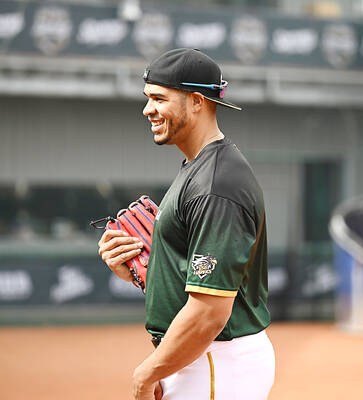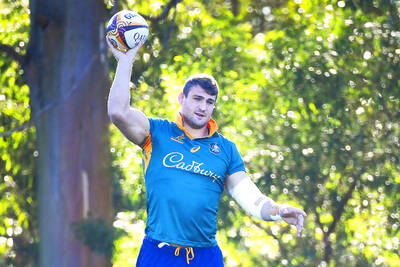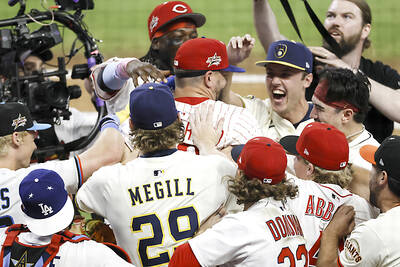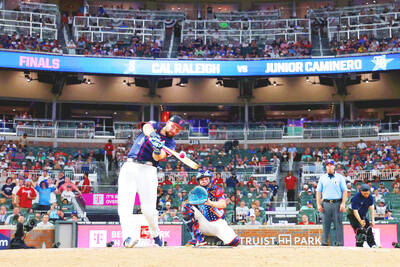Early one morning, Nigel Owens scrawled a note saying he “just couldn’t deal with it any more” and crept out of his parents’ house. Fat, lonely, bulimic, addicted to steroids and secretly gay, Owens climbed high above the Welsh valley where he grew up and waited for the sleeping pills to take hold.
He has no memory of being saved but was spotted and taken to hospital by a police helicopter. If his rescuers had arrived half an hour later, he would have been dead.
Nearly 13 years on, Owens is not fat, or bulimic and certainly not on steroids. Most notably, his sexuality is no longer a secret. This is a big deal because Owens is an international rugby union referee. Being a referee is a lonely job; being the only professional — player or ref — brave enough to be openly gay must be lonelier still on rugby union’s pitches.
Being open about his sexuality has done Owens no harm. Enjoying his 21st season as a ref, he is a television personality in Wales and has just published his autobiography.
“When I came out, it took a lot of weight off my shoulders that I was accepted, that I was gay and it made no difference,” he explains. “My refereeing improved because I was happy and my career took off.”
Owens is 37 and it took 20 years before he could tell people about his sexuality. Raised in the village of Mynyddcerrig in Carmarthenshire, he played rugby and dated girls. It was only in his late teens that he realized he was attracted to men. He fought his feelings.
“I didn’t want to be gay,” he says. “It was frightening. Coming from this old-fashioned, close-knit community, I didn’t really know what a gay person was or looked like. I remember walking into town and making a point of going to a hairdresser’s window to see if I could see a gay person there.”
He was never much of a rugby player, he says, and stumbled into refereeing after he botched a last-minute penalty for his school team.
“The sports teacher said, ‘Go and referee or something, will you?’ and that’s what I did. All by chance. And that changed the course of my life,” Owens said.
He began refereeing locally, while working as a technician. Aged 19, he lost 26kg in three months.
“I would eat too much and then I’d make myself sick, knowing that if I made myself sick I could eat something else,” he says.
So he started doing weights — and steroids.
“I was addicted to them because I’d put muscle on and I didn’t want to lose it. I was so low on confidence at that time, being gay and not wanting to be,” he says. “It was all linked up and the steroids made me depressed and short-tempered. It was a cocktail that just exploded.”
He was 24 when he tried to kill himself.
“That makes me feel so ashamed and angry with myself. I can’t imagine what my parents went through for those hours until I was found,” he says.
Owens kicked steroids and began to progress as a referee. Seven years ago, he became one of Wales’ first three professional referees. But he would still avoid being seen out with men.
Until he came out in 2007, his fear sabotaged his relationships.
“I didn’t want players or spectators or anyone to know because I was scared of it,” he says. “Would I get abused? Would I be able to continue as a referee?”
Owens has been encouraged by the sport’s reaction to his sexuality. He says he has never suffered discrimination.
“Hand on heart,” he declares, he has not heard any homophobic abuse from rugby crowds either.
“I’ve heard the odd comment like ‘We’ve got the bent referee today’ and everybody laughs because they think the referee is bent because he’s going to award tries to the home side. That’s a joke and banter. You laugh about it and that’s the best way to deal with it,” he says.
Owens hopes his example might help young people who are troubled by their sexuality.
“People, especially children, still see somebody who is gay as somebody who is camp,” he says. “Since my book came out, I’ve been replying to messages on Facebook from people who were glad there was someone they could think of as ... a role model. I had an e-mail from a rugby-playing guy in his early 20s who is gay but has been hiding it. After reading this he decided to tell his friends, and they have been great with it.”
Does refereeing spoil Owens’ enjoyment of the sport?
“It enhances it. You’re part of it. If I’d been a player I would never have been good enough to play at the Millennium Stadium, where I refereed last year,” he says.
“That was a great experience. I tell young people, not everyone will play for their country but there could be an opportunity for you to referee for your country. That’s probably the next best thing. For me it’s the best thing.”

Tainan TSG Hawks slugger Steven Moya, who is leading the CPBL in home runs, has withdrawn from this weekend’s All-Star Game after the unexpected death of his wife. Moya’s wife began feeling severely unwell aboard a plane that landed at Taiwan Taoyuan International Airport on Friday evening. She was rushed to a hospital, but passed away, the Hawks said in a statement yesterday. The franchise is assisting Moya with funeral arrangements and hopes fans who were looking forward to seeing him at the All-Star Game can understand his decision to withdraw. According to Landseed Medical Clinic, whose staff attempted to save Moya’s wife,

Wallabies coach Joe Schmidt yesterday backed Nick Champion de Crespigny to be the team’s “roving scavenger” after handing him a shock debut in the opening Test against the British and Irish Lions Test in Brisbane. Hard man Champion de Crespigny, who spent three seasons at French side Castres before moving to the Western Force this year, is to get his chance tomorrow with first-choice blindside flanker Rob Valetini not fully fit. His elevation is an eye-opener, preferred to Tom Hooper, but Schmidt said he had no doubt about his abilities. “I keep an eye on the Top 14 having coached there many years

ON A KNEE: In the MLB’s equivalent of soccer’s penalty-kicks shoot-out, the game was decided by three batters from each side taking three swings each off coaches Kyle Schwarber was nervous. He had played in Game 7 of the MLB World Series and homered for the US in the World Baseball Classic (WBC), but he had never walked up to the plate in an All-Star Game swing-off. No one had. “That’s kind of like the baseball version of a shoot-out,” Schwarber said after homering on all three of his swings, going down to his left knee on the final one, to overcome a two-homer deficit. That held up when Jonathan Aranda fell short on the American League’s final three swings, giving the National League a 4-3 swing-off win after

Seattle’s Cal Raleigh defeated Tampa Bay’s Junior Caminero 18-15 in Monday’s final to become the first catcher to win the Major League Baseball Home Run Derby. The 28-year-old switch-hitter, who leads MLB with 38 homers this season, won US$1 million by capturing the special event for sluggers at Atlanta’s Truist Park ahead of yesterday’s MLB All-Star Game. “It means the world,” Raleigh said. “I could have hit zero home runs and had just as much fun. I just can’t believe I won. It’s unbelievable.” Raleigh, who advanced from the first round by less than 25mm on a longest homer tiebreaker, had his father